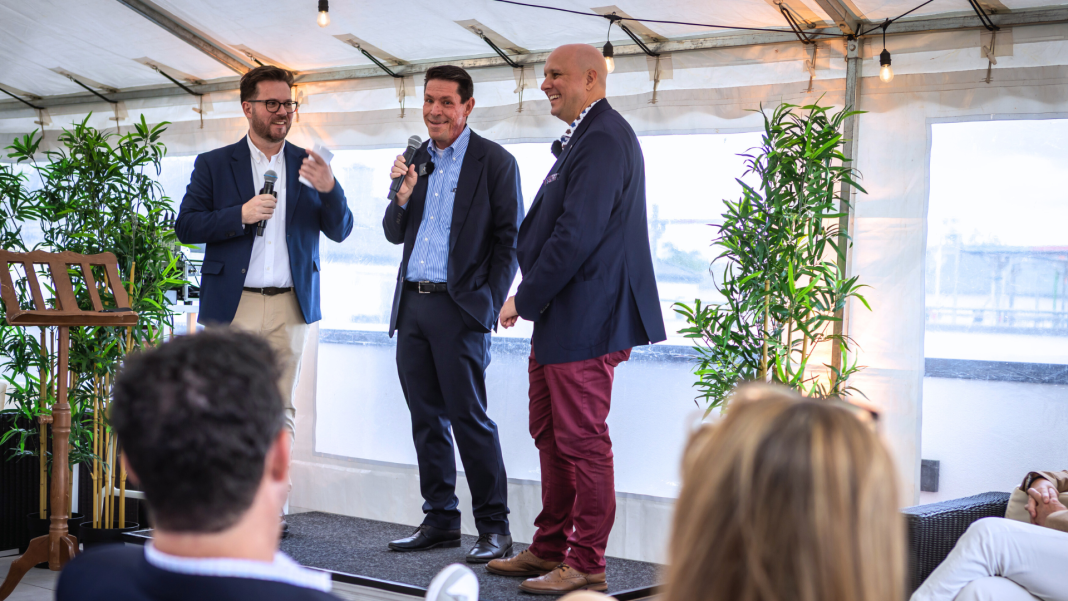With the global space economy poised to triple in size, a high-level delegation of American aerospace and defence executives visited Luxembourg this month to explore strategic investment opportunities.
A handful of American aerospace and defence companies gathered for a private-sector roundtable held at Thomas & Piron’s Les Hauts de Belair site on 16 July. One of just many visits for the delegation led by Paul Binsfeld, Honorary Consul of Luxembourg to Arizona and New Mexico.
The evening provided an ideal forum for further exploration of Luxembourg’s unique business incentives. The delegation included around 20 individuals from Smead Capital Management, BlackStar Orbital, Crow Industries, International Business Group, DCI Group, Kragon Space, Paragon Space, Lusense Insurance, Charter Space, Arizona State University and the Arizona Space Commission/State of Arizona.
It was the second trip that Space Commissioner for the State of Arizona, Brett Mecum, had made with Binsfeld. For this delegation, Mecum explained during the roundtable, “We actually had to turn down several space companies that wanted to come, but we had too many people. So I think there’s probably a return trip in the cards in the near future.”
As Mecum pointed out, the global space economy is expected to reach $1.8 trillion by 2035—tripled compared to around $600 billion in 2024. “The fact that Luxembourg got in early and built a space agency that is commercially focused was a very, very novel thing,” he said. “From where we sit in Arizona, we want to have a strategic partner. We see the value of what Luxembourg is doing in space right now, and we see the value of what we’ve done in the past in defence and the fact that we’re a rising space state.”
The “game changer” for Luxembourg, per Mecum, was putting the Luxembourg Space Agency under the authority of the Ministry of the Economy, because there’s a “commercial focus”.
In an interview with Binsfeld following the roundtable, he added that, “Space and defence companies really like the ecosystem that was set up here [and] how easy it is to get to people” and that there was “very real interest” in Luxembourg amongst the delegation. The companies in the delegation were “very impressed. We had an amazing reception here.”
The delegation had the chance to interact with the Luxembourg Chamber of Commerce and the American Chamber of Commerce (Amcham), the Luxembourg Space Agency, and the European Investment Bank (EIB), among others. Binsfeld praised the EIB’s recent stepping up European defence financing, adding that this was another interesting aspect for the participants.
Broader challenges facing Luxembourg
Amcham Luxembourg is often among the first organisations American professionals land on upon their arrival. Affiliated with the Amchams in Europe as well as the US Chambers of Commerce, the non-profit not only addresses concerns of local Americans, but also those within the wider, international and English-speaking business community. It also regularly fosters discussions and events around transatlantic relations, most recently around the EU-US trade deal, for instance.
While Amcham Luxembourg CEO Paul Schonenberg similarly praises many of the aspects about living and working in Luxembourg, he has also warned of economic and social challenges the country faces when it comes to attracting and retaining an international workforce.
In a letter dated 15 April and shared with Forbes Luxembourg, Schonenberg wrote to Luxembourg Prime Minister Luc Frieden to share his views on these challenges, outlining a nine-point action agenda to tackle them. These include finance ministry activities, regulatory simplification and government cost management banking access, transatlantic trade and investment partnership enhancement, NATO cooperation initiatives, Luxembourg pension reform, micro-housing actions, empowering citizens through education and enhanced English language adoption.
Of these points, Schonenberg stressed two in particular during a recent interview. One is the corporate tax rate: while he praised the government for moving in the right direction to reduce tax burdens on companies, he has called on “lowering the corporate tax rate to the EU average of 21% (or lower to 20%) to ensure our competitiveness as the preferred business location”.
Additionally, he explained, “There are significantly more regulatory compliance issues in Luxembourg and in Europe than in the US. The US is much more fiercely pushing in the direction of further deregulation and simplification and lowering the cost of implementation.”
Schonenberg has also been urging for housing solutions, encouraging “governmental action to allow us and others to create and make affordable 30m2 micro-housing units available for single occupancy usage.” Additionally, when it comes to attracting new talent, he’d like to see more efforts for English as a means of communication. “Encouraging wider English language fluency and use will make Luxembourg more welcoming for those we want to attract to live and work with us,” he wrote.
Read more articles:
Blue Origin Lands In Luxembourg: What Does It Mean For Europe?

